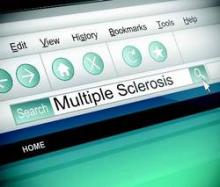BERLIN– The risk of multiple sclerosis in patients with depression or bipolar disorder is roughly double that of controls free of those psychiatric diagnoses, according to a Swedish national study.
In contrast, having schizophrenia actually appeared to protect against developing MS, a finding that cries out for further study, Dr. Viktoria Johansson observed at the annual congress of the European College of Neuropsychopharmacology.
The observed association between MS and mood disorders cannot be explained by shared genetic predisposition. In this Swedish study, having a sibling with depression or bipolar disorder did not increase an individual’s risk of MS, noted Dr. Johansson, a psychiatrist at the Karolinska Institute, Stockholm.
She and her coinvestigators searched the Sweden’s National Patient Register, which incorporates the nation’s entire 8.2 million population and identified all individuals born during 1932-1991 who carried an ICD diagnosis of depression (172,479 patients), bipolar disorder (30,761), bipolar type 1 (8,695), schizophrenia (22,781), or MS (16,467 patients). Ten unaffected controls matched for birth year and sex were randomly selected for each subject. The prevalence of MS was 83% greater in patients with bipolar disorder than in controls. The prevalence of the neurologic disease was 2.29-fold greater in those with bipolar type 1. Patients diagnosed with depression had an 86% increase in MS.
In contrast, individuals with schizophrenia were 38% less likely to have MS than did controls. This finding came as a surprise to the investigators. MS is an autoimmune inflammatory disease, and mounting evidence points to neuroinflammation as playing a key role in depression, bipolar disease, and schizophrenia. However, while some smaller prior studies have reported an association between MS and schizophrenia and others have not, the very large Swedish registry study is the first to point to the psychotic disorder having a possible protective effect.
One hypothesis Dr. Johansson hopes to explore further is that contemporary antipsychotic medications exert a protective effect against MS. That would be ironic, given that the first-generation antipsychotics were famous for causing movement disorders, particularly tardive dyskinesia, as a prominent side effect.
Dr. Johansson’s study was funded by the Swedish Society of Medicine and the Karolinska Institute. She reported having no financial conflicts.


